Right or Wrong
One of my clients had a “right or wrong” dilemma that was seriously testing his conscience. He could achieve an outcome that would be good for everyone, but to do it he would have to break a few rules. The alternative was an outcome that would be bad for at least some people in the picture.
Of course I had my client think through the possible consequences of each option. We used other decision-making tools such as the 10-10-10 exercise. We ideated new alternatives. Ultimately, it came down to a choice that would test his conscience no matter which he chose.
This was several months ago, but one part of that discussion has stuck with me.
People often try to put choices in two simple categories: right and wrong. Life, however, rarely works that way. Virtually nothing is truly binary.
Legal, Ethical, and Moral instead of Right or Wrong
Instead of dealing in “right or wrong,” I asked my client to describe his dilemma in terms of three different dimensions: legal, ethical, and moral.
The binary thinking of “right or wrong” tends to lump all three together, but that simplistic thinking ignores important nuance that can lead to better decision making. Rational, logical, intelligent people can disagree on “right or wrong” for a specific question even when they agree on many other things.
Rather than talk about my client’s dilemma (in order to protect his privacy), for the purposes of this article I will look back at a specific decision I had to make in 2021. At the time, I was head of fundraising for a cancer nonprofit. COVID-19 had eased off in the summer, but just about six weeks before our annual gala dinner, the Omicron variant started heating up.
It was up to me to decide whether to hold our event (a black-tie dinner for 300 people at a local winery) or go virtual-only. We would raise a lot less money with a virtual-only event, and we would also lose our deposits on the venue and other services. Plus, a lot of people were eager to hold the dinner after canceling it in 2020.
So, with Omicron heating up and the added pressure of raising money in a tough year, how could I decide?
Map the choices
Imagine a Venn Diagram with the three different dimensions—ethical, legal, and moral—each in their own circle. Map each of the choices into the diagram to see where they land. Having this visual might make it easier to eliminate some options or to identify the right path ahead.
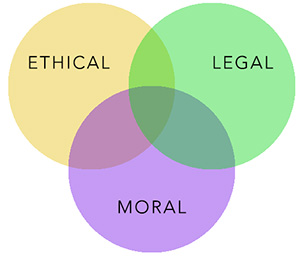
For each option you’re considering, ask yourself these three questions:
1. Is it legal?
Legality seems like a no-brainer. I would never counsel my clients to do something illegal. It’s still a worthwhile question, however, because legality is distinct from ethics and morals.
In some situations, you may need to expand the definition of “the law” to include company policies, homeowner association rules, etc. Fundamentally, this question is about whether someone could be punished by the authorities for making this choice.
Usually, the legality of something is pretty clear, but as we are seeing in many highly publicized court cases right now, that’s not always the case. (In fact, this is why courts exist.) If you find yourself in this situation, then some deeper risk analysis might be in order.
Side note: “It should be legal” is not the same as “it is legal.”
Also: “But we won’t get caught” is still “no.”
For the gala dinner, I payed close attention to the county’s health guidelines around COVID. At that time, in-person events were allowed, with masking requirements. So yes, the event would have been legal.
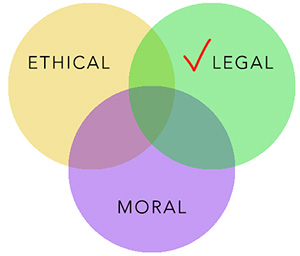
2. Is it ethically defensible?
Would rational people find this choice acceptable regardless of legality?
This is a lot squishier than the legality question, and a lot more socially-minded than the morality question. Ethical considerations often include unwritten rules and traditions, but they also exclude most faith-based and personal beliefs.
Breaking a contract is neither illegal nor immoral, but it may be unethical. Nepotism is neither illegal nor immoral, but it may be unethical. Exaggerating the crowd size at your event is neither illegal nor immoral, but it may be unethical. Detail and context matter.
In the case of my fundraiser gala, we could hold the event and stay on the good side of ethics by taking extra safety precautions and by being completely transparent about the risks with potential attendees. If something went wrong, rational people would say, “They did all they could and gave people all the information to make an informed choice whether or not to attend.” It would still feel uncomfortable making this defense if something went wrong, but at least it would be ethically defensible.
Simply trusting to luck or telling everyone they would be safe, however, would have been unethical. Many of our event attendees were immune-compromised cancer patients and survivors; putting their health at risk would clearly not be defensible from an ethical perspective. I would further argue that even if all our attendees were healthy and robust, being less than 100% transparent with them would be less than ethically defensible.
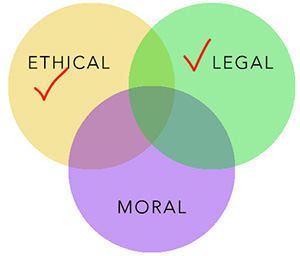
3. Is it morally acceptable?
Do you feel that this option is right or wrong?
The emphasis in that question is on you and feel.
There’s a difference between “do you think it’s morally acceptable” and “will others think it’s morally acceptable.” For any question of morality, I guarantee you will find someone who disagrees with you.
Morality is a profoundly personal question because it combines all your core values, cultural identity, faith, personal experience, bias, scars, and worldview into one funnel of judgment.
Many of our most contentious debates in American politics today are, at their core, disagreements on a moral basis. We are unable to reach compromise because we quickly entrench and pick sides on right or wrong instead of accept the idea that we might differ in our fundamental moral codes. When we accept that, we can at least have a discussion toward compromise, even if ultimately we find compromise to be elusive.
It’s important to understand how your own judgment funnel shapes your understanding of any dilemma you face. How will you feel after making this choice? Will you be able to sleep at night, look yourself in the mirror, and any number of other “how can you live with yourself” clichés?
In the case of my fundraising gala, neither I nor any of the other staff would have been okay if our gala turned into a superspreader event and someone got hurt or died. Thus, even though we knew it was legal and we felt it was ethically defensible, our hearts told us the potential risk was not worth the possible gain.
I ended up deciding to cancel the dinner and run the event virtually. We met our fundraising goal, though I’m sure we would have raised far more money if we’d held the dinner in person. I have zero regrets, though, knowing we did the “right” thing.
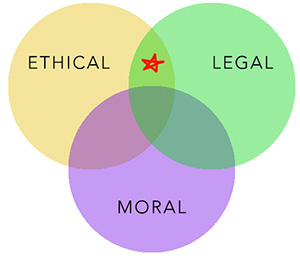
Map all the options on the “right or wrong” Venn Diagram
The sweet spot for any choice, of course, is the center of the diagram where you know the choice is legal, ethically defensible, and morally acceptable.
But if you’re in a dilemma, then probably something is a bit off with at least one of those dimensions for all of your options.
At a different time in my career when I was much younger, a colleague and I were faced with what we perceived was a difficult ethical dilemma. A highly valued and influential client was pressing us for information they weren’t entitled to. We took the question to our boss for guidance, and she said, “If you have to ask the question, then you already know the answer.”
We realized right away that we had been on the verge of compromising ethics under the pressure the customer was putting on us. There was nothing illegal or immoral about giving the customer the data they wanted, but doing so would have been very difficult to defend ethically.
Had we mapped our options on the diagram, we would have seen our answer right away and wouldn’t have had to check with our boss.
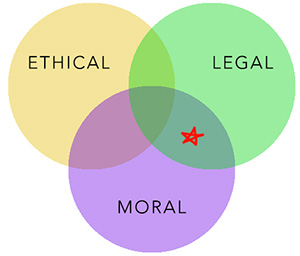
No tool answers all “right or wrong” questions
As with any decision-making tool, this is just one of many that can help clarify choices when you’re in a difficult spot.
Often, it may lead you to more questions or other options you hadn’t considered before. It can also provide a better path to clear up conflict by making everyone think more clearly about the difference between moral, ethical, and legal considerations—people might find they agree on many points and disagree only on one or two things, which you can then set about tackling instead of just shouting “you’re wrong” at each other.
Also, It’s important to recognize that while we all have freedom of choice, none of us has freedom from consequence.
An action that may feel a moral imperative may actually get you thrown in jail. Or holding an ethical hard line may get you ostracized from some communities of faith, or may even get you fired.
Sign up for a free coaching consultation
Looking to be a better leader? Contemplating a career change? Struggling with a big life question? Want to write or publish a book? Thinking about retirement? I can help. Schedule a free coaching session now.
Get my core values exercise free
This simple worksheet helps identify your core values. Many of my clients find it surprisingly eye-opening, and it’s helped people make some big life decisions. Get it here.



3 Comments
Jen Pierce · August 29, 2024 at 6:32 am
Love Venn diagrams and really love this one, Peter! I am going to use it with my clients – giving all credit to you, which I think hits the sweet spot of legal, moral AND ethical!
Peter · August 29, 2024 at 10:16 am
Thank you, Jen! A lot of smart people love Venn diagrams. 😉 I always appreciate you insights and comments. Thanks for paying attention. 🙂
Why checks and balances on power matter · October 14, 2025 at 3:29 pm
[…] number of people had to evaluate the moral, ethical, and legal aspects of posting that. I’m sure a number of those people were just following orders, which is a […]